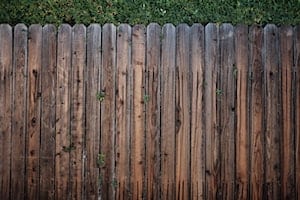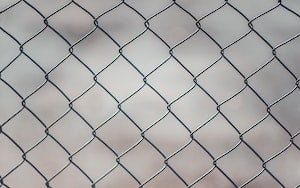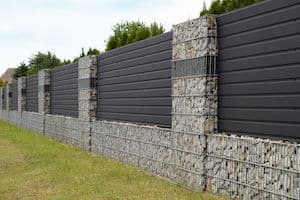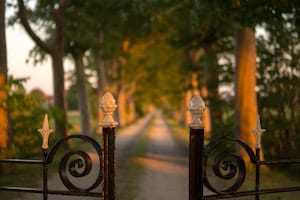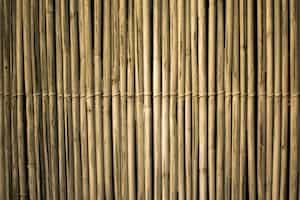What is the Best Material to Build a Fence? 7 Options with Pros and Cons
The choice to build a fence is a good one, and a decision that will ultimately not only bring security but curb appeal to your home. But where do you start? With hundreds of fencing designs and materials available today, the process can be overwhelming. That’s why we have narrowed down the pros and cons of some of the best fencing types on the market to help you decide what type of fence you should get.
Best Fence Material:
- Wood
- Chain Link
- Aluminum
- Vinyl
- Steel
- Wrought Iron
- Bamboo
Now that you have an idea of what’s available, let’s take a deeper look at each one to help you decide which one is right for you.
Wooden Fences: Pros and Cons
PROS: Wood is one of the most popular and most known materials that are used for fences today. It’s a very affordable and good-looking material that comes in a wide variety of styles and designs. If you are looking for a fence that provides you with a sense of privacy and security, wood is a great choice because of how close you are able to assemble the panels. As an added plus, wood is incredibly easy to paint and stain to get the exact feel you are looking for. For those on a budget, there are also options for cheap fence panels available in wood, allowing you to achieve both style and affordability in your fencing project.
CONS: Unfortunately, wood is a material that needs to be maintained, and over time it can get pretty expensive and time-consuming. While staining the wood is beautiful, it is something that has to be done semi-regularly to keep up the good quality. Warping and even some rotting can occur as a result of extra moisture from bad weather. And sadly, with this rotting and warping comes unwanted pest infestations.
Chain Link Fences: Pros and Cons
PROS: Just like the wood, chain-link fences are also very inexpensive, but also make very long-lasting fences. Unlike wood, however, chain-link is practically maintenance-free, which is a huge benefit. Because this material is so affordable, chain-link fencing is very popular and is seen around many people’s homes. Because chain-link has been galvanized, the material will last for a long period of time with almost no needed maintenance. An added plus of this material is that it is incredibly flexible.
CONS: Chain-link fences look pretty dull, and honestly a bit ugly. Because these types of fences are used in locations such as schoolyards, electrical enclosures, and even prisons, they are avoided by more high-end homeowners. Chain-link is also very easy to see through, which eliminates the security factor. Because they are so easy to climb over, you shouldn’t pursue this option if you are looking for a perimeter that provides protection.
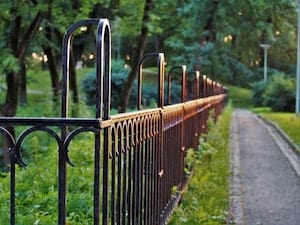
Aluminum Fences: Pros and Cons
PROS: Aluminum is one of the most durable materials you could get for your fence. On top of it being inexpensive and versatile, aluminum requires little to no maintenance and it can even be installed by hand.
If you do need to hire a professional fencing company, the cost won’t be anywhere near what the cost is to install other types of material. If your home is on a hill, or you need a fence installed on an area that is inclined or sloped, aluminum is a preferred choice. On top of that, it can be installed in a wide variety of colors and designs to best fit the aesthetic of your home.
CONS: Aluminum is a more expensive material and will definitely cost you more than a wooden fence installation. The good news is that because there is almost no maintenance, this type of fence will end up costing you way less over time. Even though this material isn’t as strong as steel, it’s still a very durable and reliable material that will withstand most conditions. Aluminum isn’t a good choice if you are looking for any kind of privacy, so you might want to check out some other options if that is a priority.
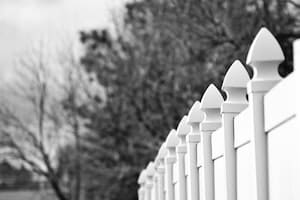
Vinyl Fences: Pros and Cons
PROS: Like wood and chain-link, vinyl is quite inexpensive and is available in many different designs, colors, and styles. Even with affordable prices, vinyl does not lack in durability and strength, so blistering, warping and rotting are things that you don’t have to worry about. Because the pieces snap together, vinyl is very easy to install. This can save you a lot of time and money if you have a tight budget or a busy schedule. Some types of vinyl even have an inner layer of aluminum that gives it even more strength and durability.
CONS: Even with all of the benefits of vinyl, there are still some flaws. While this material is quite durable, there are other fencing materials that provide a lot more strength and security. On top of that, there is a bit more cost on the front end of the installation process, and can even crack or brittle if the temperatures get extreme.
Steel Fences: Pros and Cons
PROS: If you are looking for strength in fencing material, look no further than steel. Steel is long-lasting, powerful, heavy and will protect your property like other materials never could. Steel is a very secure material that can be used to protect your property. It’s strong enough to hand the weight of a full security camera system. This material can be treated to avoid rust, and can also be installed on any kind of slope or inclined if done by a professional contractor.
CONS: With security comes expenses. Steel can be quite pricey and is lacking in variety on many levels. Because steel is so heavy, it is not recommended that you try an install on your own. Professional fence companies may even recommend other fencing materials because steel is usually used for industrial reasons and not a great option for residential purposes.
Wrought Iron Fences: Pros and Cons
PROS: If you are looking for a fencing material that would be great for decorative or creative designs, wrought iron should be a high contender. Wrought iron is a strong and beautiful material that doesn’t need a lot of maintenance. Because of irons durability, you can trust that your fence won’t be deteriorating or going anywhere any time soon. On top of beautiful aesthetics, wrought iron is one of the strongest materials you could use for a fence, and will undoubtedly give you the security and protection you are looking for in a fence. Iron will not dry out, warp, rot or be attractive to pests for infestation, which is another big benefit of wrought iron fencing.
CONS: Wrought iron is easily one of the most expensive fencing materials that you could use. Also, because this material is so heavy and difficult to work within the installation process, it can slow things down dramatically. If you are an environment that has a lot of excess moisture, rust spots are able to form easily as a result of part of the fence being chipped, scratched or damaged which can be very unappealing.
Bamboo Fences: Pros and Cons
PROS: If you are looking for an environmentally friendly option for your fencing, bamboo is a really great choice. While wood fences add to deforestation, bamboo grows very quickly. On top of that, bamboo gives you a very attractive and exotic aesthetic with a natural finish that can be stained in any color you like.
As time goes on, bamboo ages beautifully by taking on a silvery shine that just adds character to your fenced-in environment. You are able to install this material by stringing the poles together, or by even having a live fence if the climate is permitting. Bamboo is extremely durable and will last you a very long time. With almost no maintenance needed, bamboo can an excellent choice for your home.
CONS: Even with all these benefits, bamboo as a fence material can have a few downfalls. While it is a beautiful material, it is quite expensive. Bamboo will end up costing a lot more than vinyl, metal or even wood fencing materials. Because you need to have this material in a special climate, it needs to be ordered especially which can significantly increase the cost as well. On top of that, if you are in an environment with a lot of excess moisture, bamboo is able to rot quite easily if it is not protected ahead of time.
With so many choices and varieties on the market today, we hope that you have found these pros and cons helpful in your search for the perfect fence material. No matter what kind of fence you end up using, we wish you the best of luck on your fence building journey!

